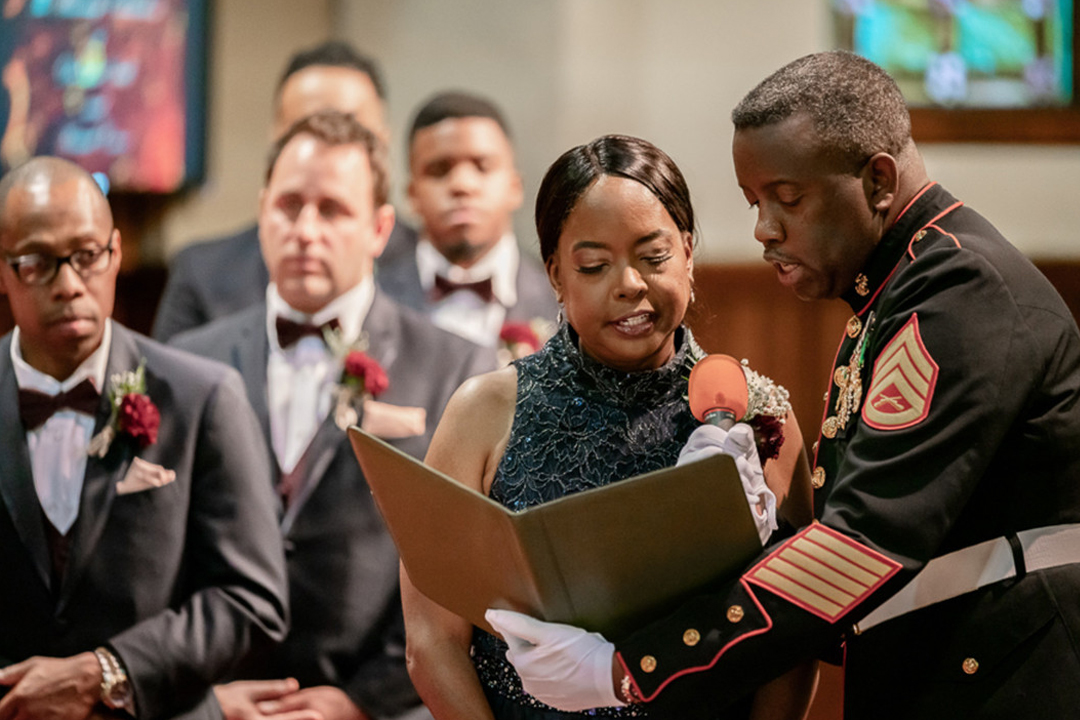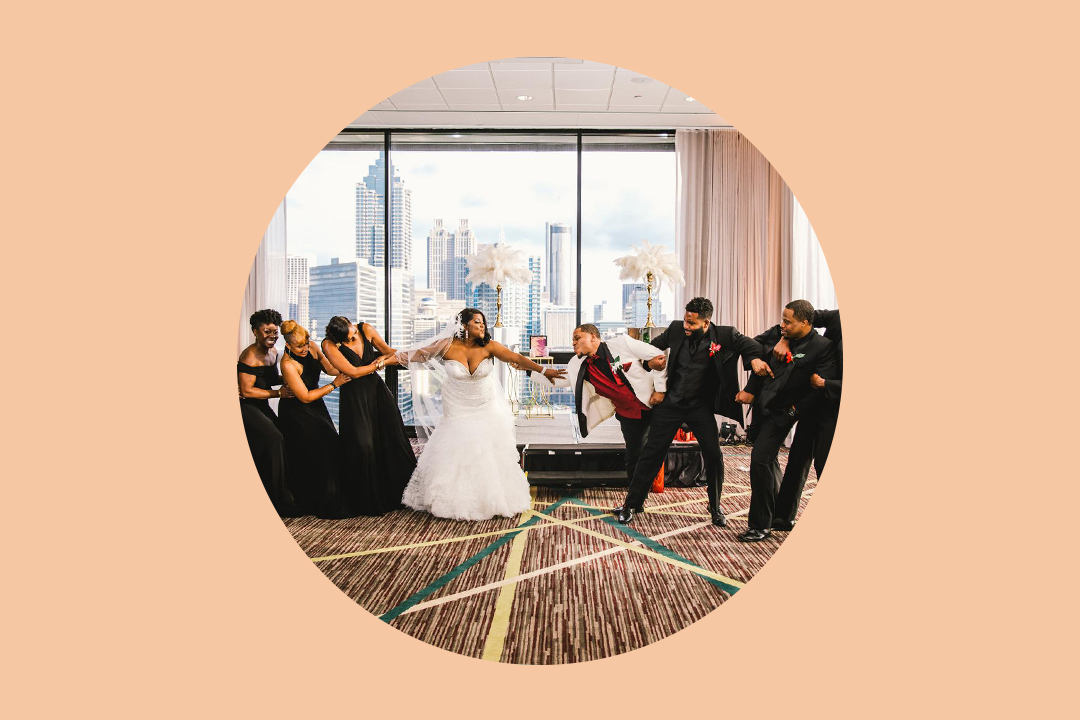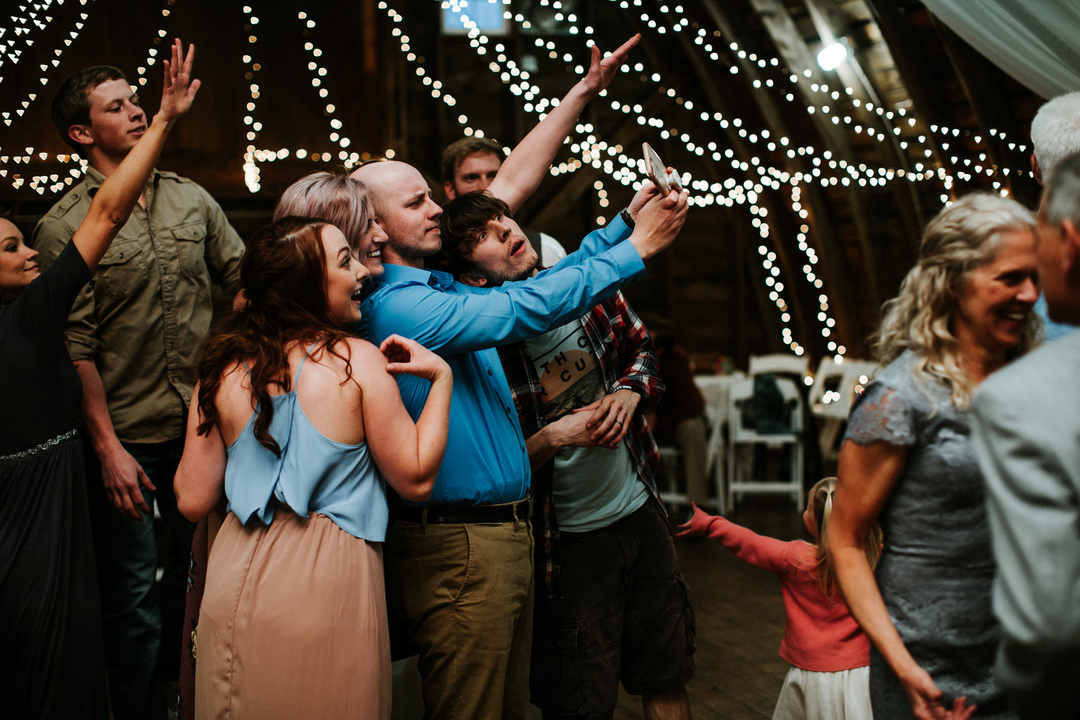- Expert advice/
- Wedding planning 101/
- Wedding planning questions/
- My Divorced Parents Don't Get Along. What Do I Do?
- Wedding planning questions
My Divorced Parents Don't Get Along. What Do I Do?
If your parents are divorced and don’t get along, there are ways to ensure your wedding day goes smoothly. Here's how to manage the drama from the ceremony through the reception.
Last updated February 5, 2024

Let’s face it: weddings make people emotional. They bring out deep-seated feelings and they can cause people to reflect on their own lives. (Throw alcohol into the mix and no wonder why people start crying.) Weddings also remind guests of their own wedding day. For couples who are still together, they likely welcome nostalgia. But if your parents are divorced and not on great terms, weddings can be tough—for them and you.
It’s not always easy to deal with divided families and parents who don’t get along. To prevent planning and day-of stress, here are some tips on how to deal with divorced parents at your wedding.
Talk to your parents early on.
It should go without saying, but your wedding is your day—and it should be without other people’s drama. Some parents are amicable enough that they will tolerate each other’s company without causing a big fuss. If your parents have been divorced for many years, chances are they’ve grown accustomed to seeing one another at family events. If this is the case, the risk for disruption is likely low.
If you aren’t confident your parents will keep their cool, or they’ve recently split, it’s best to chat with them before your wedding. If you live close, meet up with them individually and let them know how important it is to you that they keep the peace on your special day. If they live far, video calls work. These conversations can be tough, and you want to come from a place of compassion.
Clearly communicate your expectations about what behavior won’t be welcome at your wedding, and remind them that you want everyone to have a good time, including them.

Hear them out.
It’s important that during these conversations you’re open to both parents’ feelings and opinions. This is probably uncomfortable and frustrating for them, too. So, be sure to cover most bases of what and how things will go down on your wedding day. Go over details, including seating, speeches, roles, and day-of responsibilities. Ask your parents if there’s anything they’re uncomfortable with, and try to address it early on.
That said, don’t play therapist. Your parents may have unresolved issues related to their divorce, and unintentionally put you in the middle. You don’t want to play sides or hear dirty details about their split, so it’s best to kindly—but firmly—set boundaries.
Decide their roles.
Weddings are becoming more and more individualized with couples only opting to incorporate traditions that are right for them. Throw divorced or blended families into the mix, and there’s no “best” way to tackle wedding roles.
At The Ceremony...
In determining how you want your parents to be involved in your wedding, consider how close you are with them. If your dad has largely been out of the picture since you were a kid, you might not want him walking you down the aisle. Likewise, if your stepmom helped raise you, you might want her to be a wedding reader. Again, the choice is yours, but communicate clearly upfront so feelings aren’t hurt down the line.
At The Reception...
Divorced parents may not feel comfortable toasting to you together. (If they don’t get along, you probably don’t want them to either.) To make speeches as smooth as possible, have your parents speak separately. Ask your dad to give his speech before dinner courses, and your mom before dessert. Giving them space lets them both have their own time to shine and prevents them from making not-so-comfortable jokes about each other.
If your parents have a tense relationship, give your wedding photographers a heads-up. If you want certain shots, plan them out in advance so no one is forcing mom to stand next to dad.

Consider their current partners.
In an ideal situation, your parents and their respective new partners all get along. The reality, however, can be much different. No two situations are the same. If and how you want your parents’ spouses or significant others involved in your wedding largely depends on their role in your life.
If your dad remarried 20 years ago, your stepmom should be invited regardless of how your mother feels about her. If your mom has a new boyfriend you’ve only met twice, then it’s worth a conversation if you don’t feel comfortable inviting him for whatever reason.
If one parent left the marriage for the person they are currently with, having them at your wedding may be too much for your family to deal with. If that’s the case, talk to this parent and clearly explain that while you may have accepted their new spouse, you feel it’s best for everyone to have them skip the wedding.
If the situation permits, you can also tell your parents that only they are invited—date free. Because the day will be hectic as-is, you can let them know you’ll need their help and would prefer to have their full attention.
Map out seating.
Where to place your divorced parents at your wedding and reception can make all the difference comfort-wise for everyone.
If your parents have trouble being in the same room together, chances are they will be happiest sitting apart. If you know your mom would feel most comfortable following tradition and sitting front-row at your ceremony, seat your dad in the second. If both your parents have given the thumbs-up for sitting together, have some siblings or close relatives seated nearby. They can cushion any awkward interactions.
When it comes to the reception, you don’t have to seat your parents at the same table if you don’t want to. It’s perfectly OK to have them at different tables next to family members and friends they are closest with.
Enlist human buffers.
If your mom tenses up whenever she’s alone with your dad, get someone close to you to keep an eye on her. You don’t want to assign a babysitter so to speak, but it’s helpful to have someone around should anything happen. A buffer also helps prevent the stress from falling on you, as you don’t want to spend the day worrying about whether or not your parents are arguing.
The bottom line is that your wedding day is your wedding day, not your parents’. Talk to them, appreciate where they’re coming from, but make it clear that your celebration is not the time to dive into family drama. Once they see how happy you are, they’ll have a hard time not being happy, too.
Up next for you

7 Tips for Merging Cultures in a Multicultural Wedding
List
It's not easy to merge cultures, traditions, and families for a multicultural wedding. Here are expert tips on blending two or more cultures for your wedding day.

5 Effective Ways to Fight Wedding Planning Stress
How-To
Weddings are fun, but planning them can be stressful. Here are practical ways to deal with wedding planning stress.

How to Choose Wedding Readers
How To
Wedding readers have the important job of reading passages or poems during your ceremony, but who is best for the job? Here's how to choose wedding readers—and some potential wedding reader options.

How to Create a Wedding Seating Chart
How To
Don't let creating your wedding seating chart stress you out. Keep it simple with Zola's rundown of exactly how and where to place all of your wedding guests.
Featured

10 Common Wedding Party Disagreements—and How to Solve Them
How To
Sometimes issues come up between wedding party members. Here are the most common wedding party disagreements, from money to attire concerns, and how to resolve them quickly.

We Were Invited to a Friend's Wedding—Do We Have to Invite Them to Ours?
Advice
It's not always black and white—sometimes you should invite someone who invited you to their wedding, other times you don't have to. Let's break down the etiquette around this tricky guest list question.

Should I Invite My Ex to My Wedding?
Advice
It may seem obvious, but sometimes exes go to weddings. Here's how to decide if you should invite your ex to your wedding, how to deal if your partner wants to invite an ex, and how to talk about it.

How to Talk to Friends Who Weren't Invited to Your Wedding
How To
You can't invite everyone to your wedding—for a number of reasons. Read on to learn how to talk to friends who aren't invited to your wedding, tactfully.
- Expert advice/
- Wedding planning 101/
- Wedding planning questions/
- My Divorced Parents Don't Get Along. What Do I Do?
Find even more wedding ideas, inspo, tips, and tricks
We’ve got wedding planning advice on everything from save the dates to wedding cakes.
